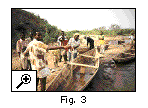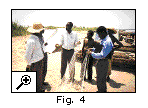|
|
 |
|
| |
 Terrestrial parks and protected lake areas provide the adjacent aquatic habitats and biodiversity with some protection from human activities. Some of these parks permit small-scale fisheries in and near the National Parks. The FPSS teams in Zambia, Tanzania and Burundi have made an assessment on the Fishing Practices in these protected areas and each has produced a situation report giving an assessment of how these practices are impacting biodiversity (Fig. 3). Terrestrial parks and protected lake areas provide the adjacent aquatic habitats and biodiversity with some protection from human activities. Some of these parks permit small-scale fisheries in and near the National Parks. The FPSS teams in Zambia, Tanzania and Burundi have made an assessment on the Fishing Practices in these protected areas and each has produced a situation report giving an assessment of how these practices are impacting biodiversity (Fig. 3).
Finally, the health of nearshore habitats depends, to some extent, on proper regulation of the small-scale fishing (Fig. 4). Legislation is in place or is awaiting enactment in all the 4 countries of the lake, that allows for the appropriate regulation of the fisheries in each country. Unfortunately financial and human resources are lacking to carry out proper enforcement and monitoring. As a result the Fishing Practices Special Study has undertaken an institutional assessment of the riparian countries' capacity to monitor and control the small-scale fisheries in their countries. From this investigation, solutions are being proposed which will alleviate the problems identified.
|
|